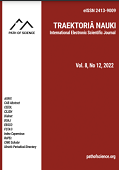Responsibilities of Land Deed-Making Officials in Making Sale and Purchase Deeds Made Without the Land Owner's Knowledge
Responsibilities of Land Deed-Making Officials in Making Sale and Purchase Deeds Made Without the Land Owner's Knowledge
Author(s): Nazhifa Salsabiela, Salim Salim, Widodo Dwi PutroSubject(s): Law, Constitution, Jurisprudence, Business Economy / Management, Administrative Law
Published by: Altezoro, s. r. o. & Dialog
Keywords: legal consequences; responsibility; sale; purchase deed;
Summary/Abstract: This research aims to analyze legal action against the Deed of Sale and Purchase made by the Land Deed Official (PPAT) without the knowledge of the land owner and the responsibility of the Land Deed Drafting Officer regarding the Sale and Purchase Deed made without the knowledge of the land owner. This research is normative legal research. The approaches used in this research are the statutory, conceptual, and case approaches. The study results show that making a Deed of Sale and Purchase without the owner's knowledge can have legal consequences; this means that the deed, as stated in Article 1320 of the Civil Code, can be filed for cancellation due to the subjective and objective conditions of the agreement not being fulfilled. Therefore, Deed of Sale and Purchase No 6657/2004 dated 1 November 2004, issued by Defendant I, is invalid or legally flawed and does not have binding legal force. PPAT's responsibility in making the Deed of Sale and Defendant I, as PPAT, violated the provisions of Article 38 § 1 of Government Regulation 24 of 1997 by purchasing without the owner's knowledge, which is an administrative offence. As a result, Defendant I, acting as PPAT, can face dishonourable dismissal. In civil terms, Defendant I's proven commission of an unlawful act requires PPAT to compensate for losses suffered by the parties. Criminally, PPAT can face accountability if it is proven negligent in checking the identity of the person present and attending to other formal matters. Then, authorities can charge PPAT under Article 266 of the Criminal Code.
Journal: Traektoriâ Nauki
- Issue Year: 10/2024
- Issue No: 1
- Page Range: 8017-8023
- Page Count: 7
- Language: English

